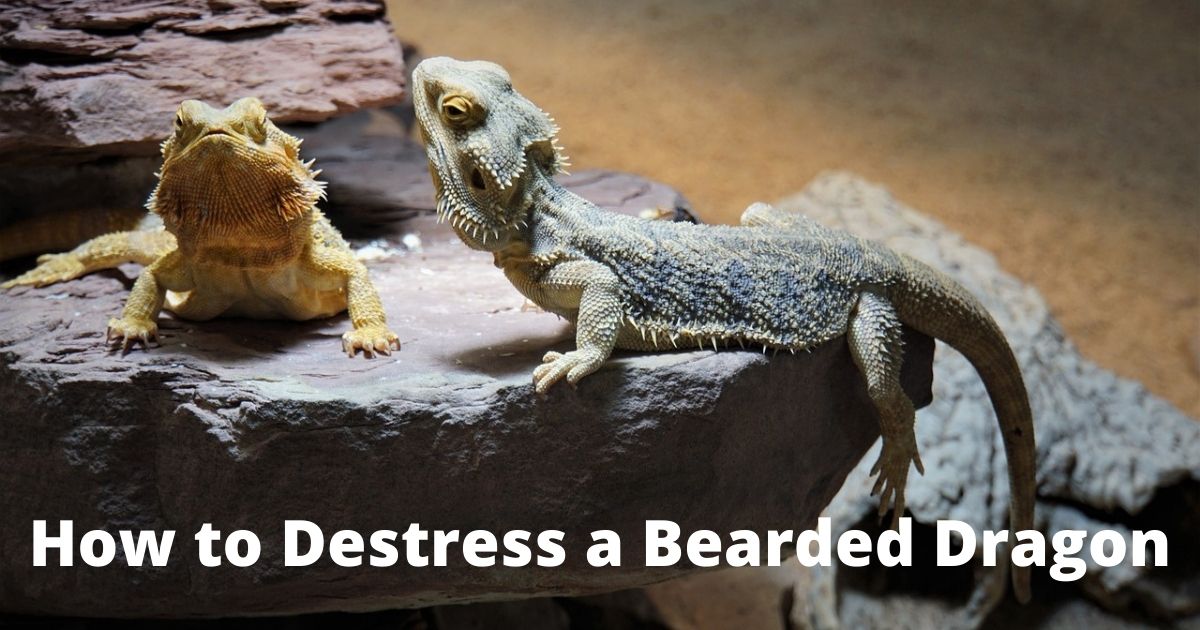As an affiliate, we earn from qualifying purchases on Amazon. We get commissions for purchases made through links in this post.
The bearded dragon is one of the most popular reptile pets globally, and it’s easy to see why. They are relatively easy to care for, can be very social, and have some fascinating natural behaviors that owners can enjoy observing like head bobbing, push-ups, and waving their legs in the air. However, even captive-bred dragons still need time to adjust to their new environments and homes.
To help your bearded dragon settle into its new home more quickly, you should take certain steps to reduce stress. Here are some tips on how to destress your bearded dragon.
Keep reading to understand how to destress a bearded dragon, how to tell when your bearded dragon is stressed, and so much more.
How to Destress a Bearded Dragon
The bearded dragon is a relatively easy pet to care for. If you’re new to reptile keeping, they’re an excellent choice.
However, they are still reptiles and need some care and attention to keep them healthy and happy.
How exactly would you destress a bearded dragon? In this next chapter, we dive deeper into that.
Let’s get straight to it.
Below are some tips on how to destress a bearded dragon
Keep the humidity up:
Like all reptiles, bearded dragons need high humidity levels in their enclosure. Try misting the enclosure once or twice a day by setting up a mister or other spray bottle at one end of the tank and spraying until it runs down the sides of the glass. If your dragon gets stressed out easily, misting may help him feel more comfortable.

Prolee Reptile Terrarium Tank Large Size
- Pet and Human Safe Materials
- Front & Roof Door With Side Louvers
- Pre-Installed Bulb Sockets With Switches
If you live in an area with low humidity levels or use air conditioning in your home, then consider getting a humidifier for your bearded dragon’s enclosure. These can be purchased online or from pet stores like PetSmart or Petco.
Bearded dragons love baths:
The best way to do this is by placing your bearded dragon in a small tank (such as a 10-gallon aquarium) and placing it in bright light for several hours per day. You can also place an infrared heat lamp above the tank so that your bearded dragon has access to heat and light.
Bearded dragons love climbing on things:
so make sure there are lots of things for them to climb up! You should ensure there terrarium tank is well equipped with the right climbing gears. This will leave you with a very happy beardie.
Hiding places:
There is plenty of hiding space for your bearded dragon; some rocks or branches will do. Such tips will tips will help reduce stress to your beardie allowing you to enjoy all the love from them.
You May Also Like: Can You Clip Bearded Dragons Nails (Truth + Tips)
How can I Tell if my Bearded Dragon is Stressed?
If you’ve just purchased a bearded dragon, it’s normal to be anxious and concerned about your new friend. But if you’re still worried after a few weeks, then it’s time to take action.
Here are the most common signs that your bearded dragon is stressed:
Not Eating
Loss of appetite or anorexia is one of the most common causes of death in captive reptiles. It’s not unusual for a bearded dragon to miss a meal occasionally, but if this happens regularly, something is wrong. The problem may be medical, but it could also be caused by stress.
Lethargy and Lack of Energy
Dull eyes and slow movements are often signs of illness or depression in reptiles. But more often than not, they’re caused by stress. Suppose your bearded dragon stops moving around its enclosure and laying out in the sun as much as usual. In that case, it could be suffering from anxiety or depression brought on by environmental changes or changes in routine.
Excessive Hiding
A bearded dragon that spends all day hiding under rocks or logs is probably stressed out about something in its environment — like another animal in its tank or being picked up too much by humans during handling sessions. This kind of behavior could also indicate illness.
Can Bearded Dragons Die from Stress
Bearded dragons are native to Australia and are one of the most popular pet lizards. They are easy to care for and very friendly. However, they can be prone to stress and stress-related health issues, including death.
What Causes Stress in Bearded Dragons?
Stress is a normal part of life for bearded dragons. They can become stressed by several factors, including:
Housing changes: Moving from one habitat to another can cause stress in bearded dragons. This is especially true if you add new toys or furniture or change anything else about the environment that might be unfamiliar to your lizard.
If you do have to move your bearded dragon from one habitat to another, make sure that both habitats are identical in size, temperature, and decor so that she will feel safe and secure.
Unfamiliar people or animals in the home: Having strangers suddenly appear in your home can make any animal feel stressed out — including your bearded dragon! It’s important to introduce new people (and their pets) into your home slowly, so they don’t overwhelm your lizard with too much excitement all at once.
When introducing new people or pets into an existing home, always do so gradually over time so that there’s no sudden change in routine for your pet.
You May Also Like: How To Calm a Sexually Excited Dog (13 Safe Tips)
Final Thoughts
It is very important to keep your bearded dragon happy and healthy. One way to do this is by keeping them well-fed, but there are other ways as well. It is a good idea to interact with your bearded dragon frequently so that they do not become bored.
If you have a beardie who seems like they are not acting like themselves, you can also do things to help them feel better. Because these lizards are so intelligent, they know when something is wrong and will show it in how they act.
Bearded dragons are social creatures who thrive on being around their owners, so if this isn’t possible for any reason, getting another beardie may be beneficial. Having two lizards instead of one will give them more company and attention than if they were kept alone with no human interaction at all (which is not recommended).

